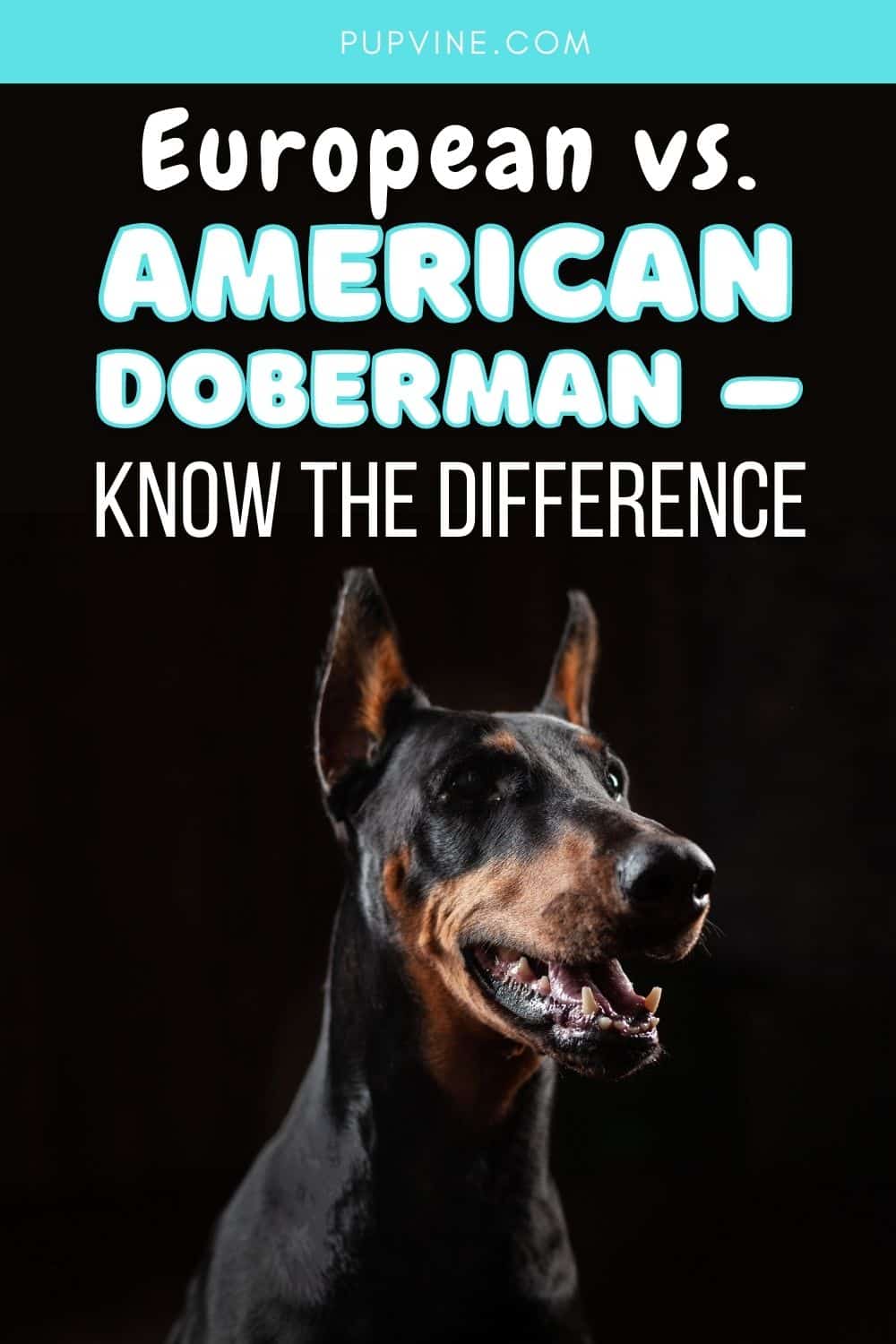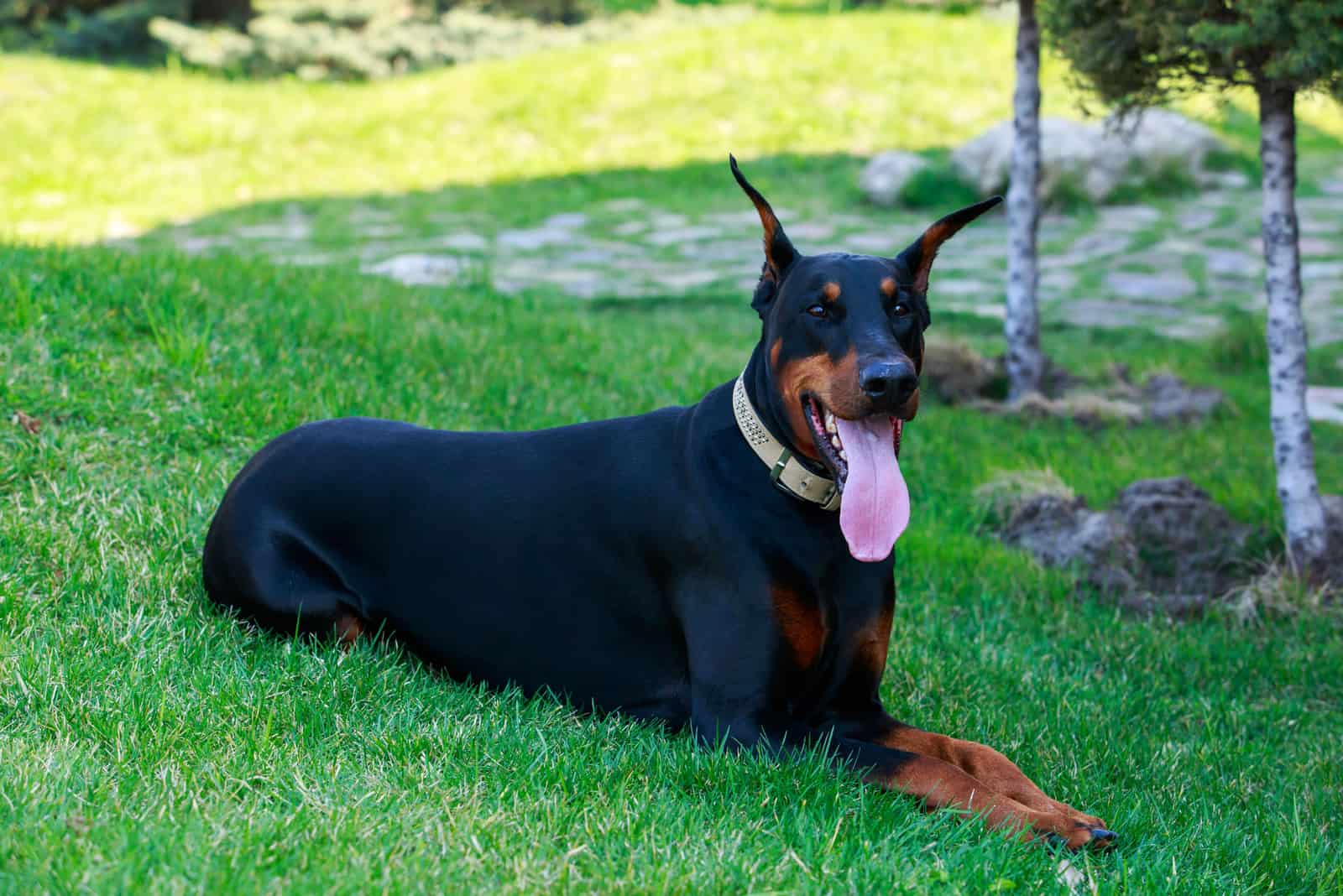Even if you are quite familiar with the Doberman breed, chances are you didn’t realize that there is more than one variant.
Did you know that there is the European Doberman (also known as the Dobermann) and the American Doberman Pinscher?
Even fewer people know all the differences between them!
At first glance, these two dogs might look almost identical. However, the key difference is that the American Doberman Pinscher is much more elegant and calmer, suited as an excellent family dog or show dog.
On the other hand, the European Doberman is more muscular and much more active, which is why he’s commonly used as a working dog. He is named after Louis Dobermann, a tax collector from Germany, who wanted to breed a canine protector to accompany him on his rounds.
Of course, the differences don’t stop there. There are plenty of good reasons why these two are considered entirely different variations.
While they look similar to people unfamiliar with the breed, you, too, will be able to distinguish them fairly quickly with a little insight.
If you want to learn more about the European vs. American Doberman, you’re in the right spot. We’ll let you know all you should be aware of if you’re aspiring to become a Dobe owner.
Here we go!
Physical Differences
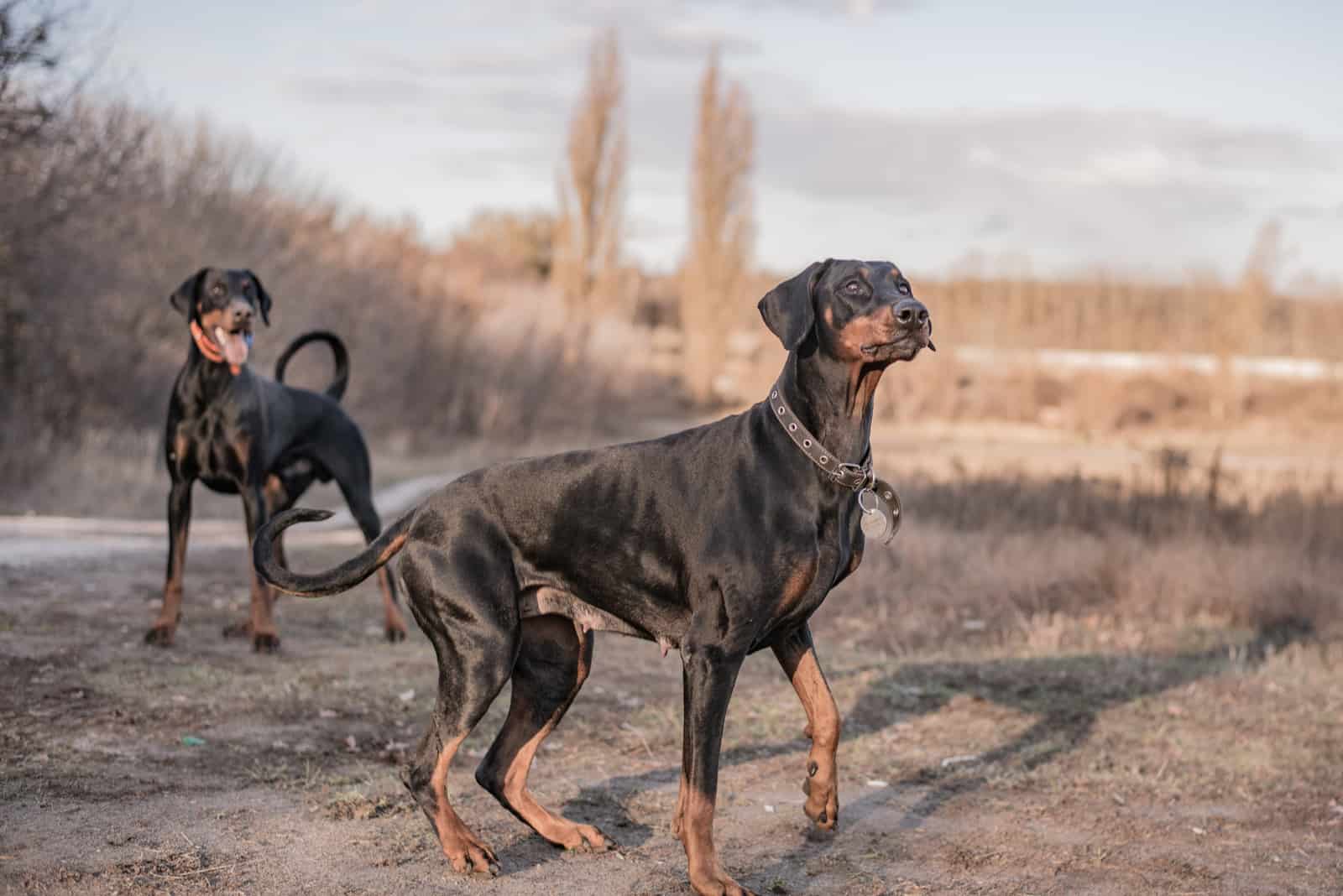
Of course, the first thing everyone notices is the physical differences between these two varieties. This is one way you can quickly distinguish European vs. American Dobermans.
Sure, each dog has its own characteristics, and even within a single breed, you can find many pups that don’t look alike. However, some general breed standards are recognized by societies such as the American Kennel Club (AKC) and the Fédération Cynologique Internationale (FCI).
We’ll look at these two clubs’ regulations to determine how dogs from these two varieties should look. While the FCI has stricter measurements than the AKC, you can still notice a pattern.
American Doberman Pinscher

Photo from: @akais_adventures
The American Doberman Pinscher is generally what people see when they think of Dobermans.
This is an elegant dog, bred to excel in the show ring and at competitions. His body is elongated, slim, and sleek. If you think about it, the American Doberman Pinscher looks a lot like a professional athlete.
This dog has long, slim but strong legs. Its paws are rather small compared to its size, and its head is shaped like a narrow wedge with smooth angles. The muzzle is also slim and long and somewhat sharp-looking, especially compared to the European variety.
The American Doberman’s body is long, thin, and somewhat lighter than that of the Dobermann.
One of the more noticeable features of the American Doberman is its long, thin neck. Its neck has an upward slope from the shoulders, giving it a graceful arch. While slim, it does widen a bit gradually towards the body.
Of course, there are some size differences when it comes to male vs. female Doberman, which is to be expected.
According to the AKC, its height is between 26 and 28 inches for males or 24 to 26 inches for females. Males also weigh a bit more than females, as they can reach the weight of 100 lbs – although they usually weigh around 75–80 lbs. Females are rarely heavier than 90 lbs but can go as low as 60 lbs.
European Doberman

Compared to the American variety, the Dobermann is much larger, built to be an excellent working dog. It is commonly used as a personal protection dog, and it accomplishes great results doing just that.
This is a large, heavy dog with a thick bone structure. It isn’t as elongated as the American Doberman Pinscher. You might even say it’s much more compact.
It has thick and muscular legs, large paws, and its head is shaped quite differently, which is a thick block-shape with fairly sharp angles. Even its muzzle is blunter and thicker.
The most noticeable difference certainly is in its neck, which is shorter, thicker, and doesn’t have as pronounced an arch as the American variant.
According to the FCI standard, the Dobermann has more or less the same height as the American Doberman Pinscher, but they typically weigh a bit more, as the minimum weight for males is 88 lbs, while females shouldn’t weigh less than 71 lbs.
Some people might even confuse a European Dobermann with a Rottweiler!
Because of their size, they can pass the IPO test intended for German Shepherds without any issues.
Another important visual difference, although not genetic, is in their ears and tails. What do we mean?
The European Convention made it illegal for European breeders to dock the tails of the majority of dogs and crop the ears of any dog breed. This means that the chances are you won’t see a Dobermann with cropped ears and a docked tail – at least in most countries in Europe.
Keep in mind that some countries didn’t adopt the European Convention. In them, you might still find European dogs with cropped ears – although this practice is slowly becoming forbidden in more and more areas.
Differences In Color

No matter their type, all Dobermans have a short, slick coat that is low shedding but still sheds a certain amount.
Color differences aren’t as prominent as other differences in these two breeds, but they still exist. In fact, if European and American dogs stood next to each other, you could easily spot them.
The most significant difference is that the American Doberman has much more variety in its coloring, while the Euro one, while typically having deeper shades, can only have two variants.
Overall, Dobermans can come in six colors. However, not all are recognized by Doberman clubs, as well as the FCI or AKC.
American Doberman
If we observe the European vs. American Doberman, we can quickly notice how the American variant is much duller in color than the European Dobermann – at least if the dog is up to AKC standards.
According to them, American Dobermans can come in these color combinations:
• Black and rust
• Blue and rust
• Red and rust
• Isabella (fawn) and rust
The markings have to be sharply defined and rust-colored, much lighter than in the European Doberman. These markings appear above the dog’s eyes, on the throat, muzzle, and chest, as well as on the legs, feet, and right below its tail.
While this is similar to the European one, the American Doberman Pinscher might also have a small white patch on its chest area. This patch shouldn’t be larger than half a square inch.
Another difference is regarding their eye color. The American Doberman typically has a somewhat lighter brown eye color than the European Doberman, but this isn’t written in stone, and it can vary from dog to dog.
European Doberman
Theoretically, the European Doberman can have all the same colors as the American dog. However, according to the FCI, the only colors that are allowed are:
• Black and rust
• Red (brown) and rust
The breed can come in many other colors, but only these two combinations are recognized. In other words, if a European Doberman has a different shade, it cannot be approved for breeding or even certified.
Like American Dobermans, the European ones have sharply defined rust-colored markings located above their eyes, on their throat, muzzle, chest, legs, feet, and below the tail. However, these markings are darker than those on American variants.
Also, they can’t have the small white patch on the chest, which is sometimes found on American Dobermans.
Their eye color is usually darker brown than in American dogs, but there are some variations regarding this, also.
Remember that every dog is different, and this is most notable when it comes to color possibilities.
If you’re a Doberman owner, don’t let the color be the main guideline. Just because your pooch is a bit duller in color doesn’t mean he isn’t a purebred European Dobie.
Also, we haven’t listed the unofficial colors, but they do occur. You may get a Doberman in some colors, such as white, that aren’t recognized by the AKC. This doesn’t necessarily mean that your pooch isn’t purebred. However, you won’t be able to register or mate him.
Differences In Temperament
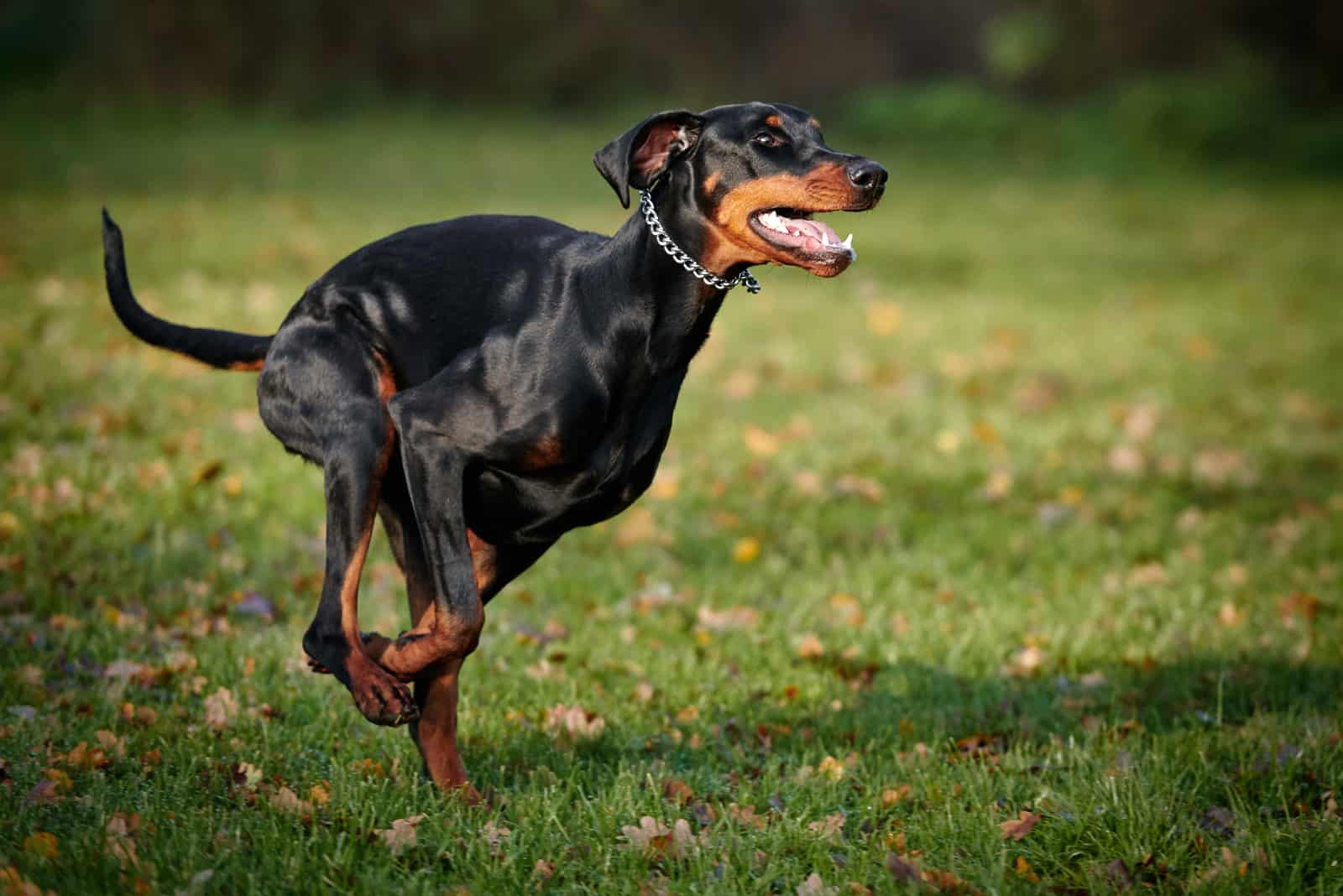
These two dogs have many similarities when it comes to their temperament. This isn’t surprising, as both come from Louis Dobermann’s watchdogs.
Both are highly intelligent, very easy to train, affectionate, alert, overly protective, and overall, loyal family companions. Both want to be in an active household and are always in tune with their family, which they consider their pack.
However, some noticeable differences do exist, and there is an ongoing debate regarding the European vs. American Doberman and which one makes a better family pet.
Here are some temperamental characteristics of both varieties.
American Doberman Pinscher
Most experts agree that the American Doberman is an ideal family pet.
This dog is calmer than the European variety and has a bit less drive – which is excellent for most owners since Dobermans are dogs with one of the highest drive levels out there.
While it would be a mistake to say that any dog dislikes resting on a sofa or couch, the American Dobie is more likely to share its personal space and want to stay close to its owners or ‘pack leader.’
You can train this dog with ease if you use positive reinforcement and a couple of soft corrections along the way. They’ll respond well to reassurance since they are overly sensitive to human emotions.
You’ll rarely see an American Doberman refusing to walk or going potty where he shouldn’t have!
Overall, they are much more cautious than their European cousins, and if you put them in unfamiliar surroundings or situations, they’ll be more careful with their behavior.

Just like the European Dobie, the American Doberman is protective of its family. If anything threatens its owners – or if it thinks this is what’s happening – it’ll bark loudly, and you can even expect some physical intervention. It’s very rare for this dog to retreat.
All in all, the American Doberman Pinscher is a fantastic dog for most dog lovers and dog owners who might not have as much experience.
European Doberman
While a European Dobermann can also make an excellent pet, they are meant to be working dogs. This makes them great for law enforcement, the military, and search and rescue.
They have a high drive level, especially compared to their American counterparts, and they are incredibly determined. However, this also means they need to have a much more intensive exercise routine, and you need to dedicate time to them.
While these dogs will also like spending some time resting on the couch, they prefer having their personal space and rarely want company.
When it comes to training, they require a firmer hand compared to the American Doberman Pinscher. They are more stubborn, and if you don’t take your time training them, they’ll prefer doing things their own way.
Unlike the American variety, chaotic environments won’t phase them, and their behavior won’t change, even if they find themselves in new surroundings. However, this can make them a bit restless at night time.
If they feel like someone or something is threatening their family, the European Dobermann is more likely to react in a way that includes physical intervention. They won’t likely retreat, and while this is excellent if you have them as guard dogs, it can be a problem in everyday life.
Overall, if you’re a beginner, you might have a tough time handling this type of Doberman.
Difference In Health
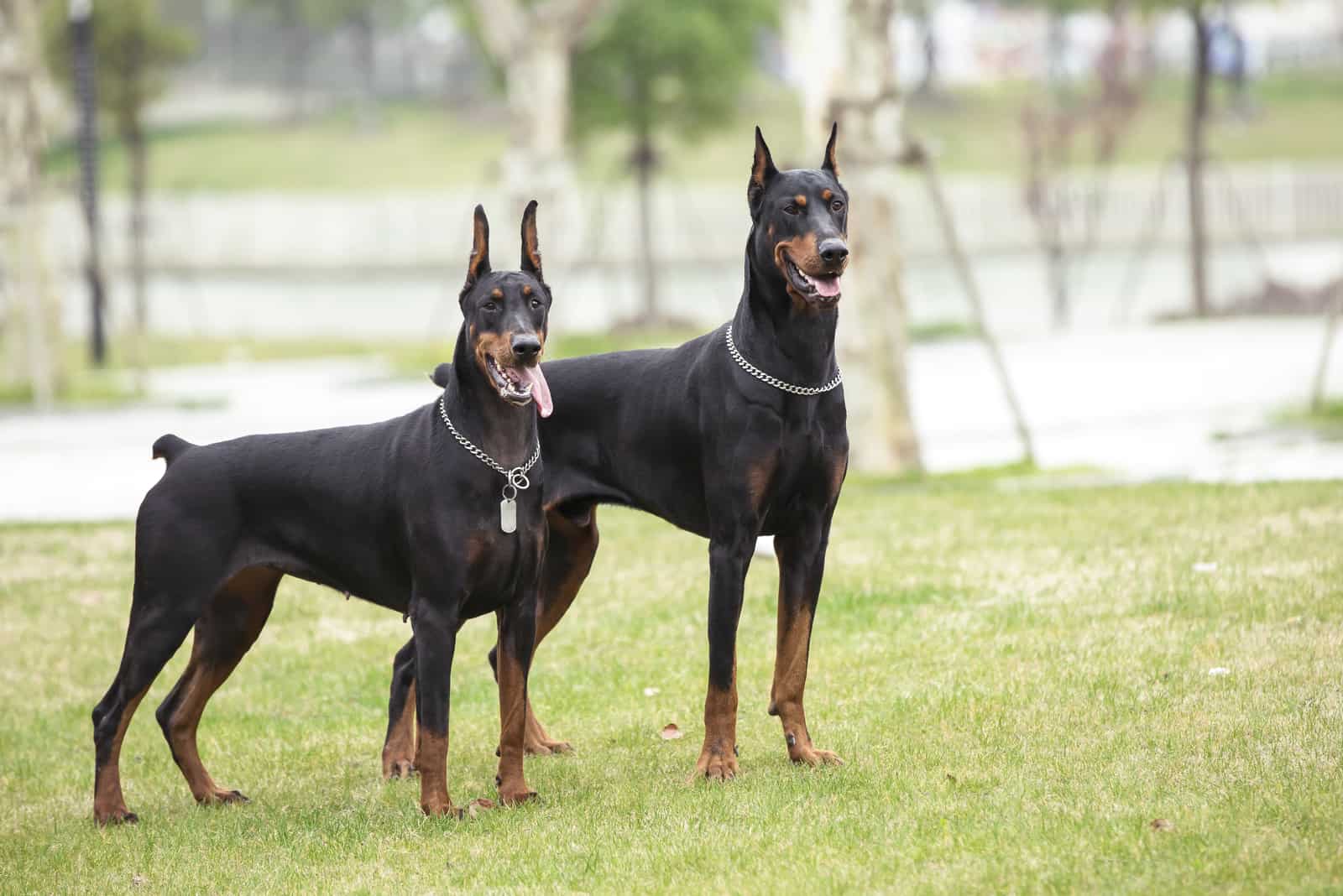
There are several studies regarding the health differences between the two varieties.
Both the European and the American Doberman are prone to several of the same health conditions, including:
• Cervical vertebral instability (wobbler syndrome)
• Chronic active hepatitis (CAH)
• Dilated cardiomyopathy (DCM)
• Gastric dilatation and volvulus syndrome (GDV, also known as Bloat)
• Hip dysplasia
• Hypothyroidism
• Osteosarcoma (bone cancer)
• Progressive retinal atrophy (PRA)
• von Willebrand’s disease (vWD)
For a long time, it was believed that European Dobermans were the healthier of the two and that they were less affected by the genetic diseases this breed has.
However, recently, the number of European dogs with health issues has increased, so this prompted new studies to determine if the former claim was indeed valid or not.
One of the ways you can avoid many health issues that plague Dobermans is to get a Doberman crossbreed, such as a Cane Corso Doberman mix, or even a crossbreed with a Pitbull.
American Doberman Pinscher
As we’ve mentioned before, both types of Doberman have a huge list of potential health problems. However, there is one advantage to the American Doberman Pinscher.
In the USA, health testing of both puppies and potential breeding dogs is much more common and affordable than in Europe.
This means that you can easily find out if the Doberman puppy you’re interested in has any genetic health issues since most American breeders conduct DNA testing regularly.
Also, a study was conducted regarding the common health problem, DCM (also known as an ‘enlarged heart’). It concluded that American Dobermans were much less likely to suffer from this condition than their European counterparts.
European Doberman
While both varieties are susceptible to the same list of genetic diseases, the European Doberman is much more prone to DCM. In fact, recent studies have shown that 58% of all Dobermanns would develop this condition at some point in their lives.
Also, genetic testing isn’t as standard in Europe – and when conducted, it tends to cost quite a lot.
While some would state this is because European Dobermans aren’t as prone to developing health problems as the breeding pool is more extensive, there doesn’t seem to be enough proof of this.
Price Differences

This difference is a bit tricky since many things influence a Doberman puppy price. This includes the bloodline, the breeder’s reputation, whether there was genetic testing done and the results, whether the dog can pass future ZTP requirements, and so on.
Ear cropping and tail docking also affect a dog’s price in countries where such activities are legal.
Also, there is a price difference between puppies who are bred to be show dogs and puppies intended to be ‘just’ pets.
The price can also vary depending on the area you live in and where you’re purchasing your pup.
American Doberman Pinscher
In the US, the average price for a purebred American Doberman Pinscher is between $1,500 (for ‘pet quality’ dogs) and $2,500 (if a dog is of ‘show quality’).
You should know that there isn’t too much difference between dogs meant to be pets and dogs intended to participate in shows.
The only difference is that the ‘show quality’ pets were examined by experts who determined that these puppies have all the breed’s desirable physical traits, meaning they can do well in breed conformation shows.
European Doberman
This is where it gets tricky.
In the US, the average price of a Dobermann is pretty high, and it goes between $2,500 and $3,500. This is because European Dobermans aren’t common in the US, so their prices are higher.
However, if you purchase a European Doberman in Europe, you’ll get by with a much more affordable price since they are fairly common. In the EU, the average cost for a Dobermann is between $500 and $2,000, depending on the pup’s ‘quality.’
Some countries, such as Russia, Ukraine, and Poland, are also known to sell Dobermanns at a very affordable price.
Because of this, many aspiring Dobermann owners will attempt importing them directly from Europe. However, there is a catch here as well.
While not confirmed, it is believed that many European Doberman breeders sell non-desirable dogs to the USA and other countries across the seas while they keep the best dogs in Europe to preserve the quality of European lines.
Still, this means that if you live in the US but buy a dog from Europe, you can get them for as little as $250 (which can raise to up to $800 if you want to have your dog shipped directly to you).
Differences In Breeding Regulations
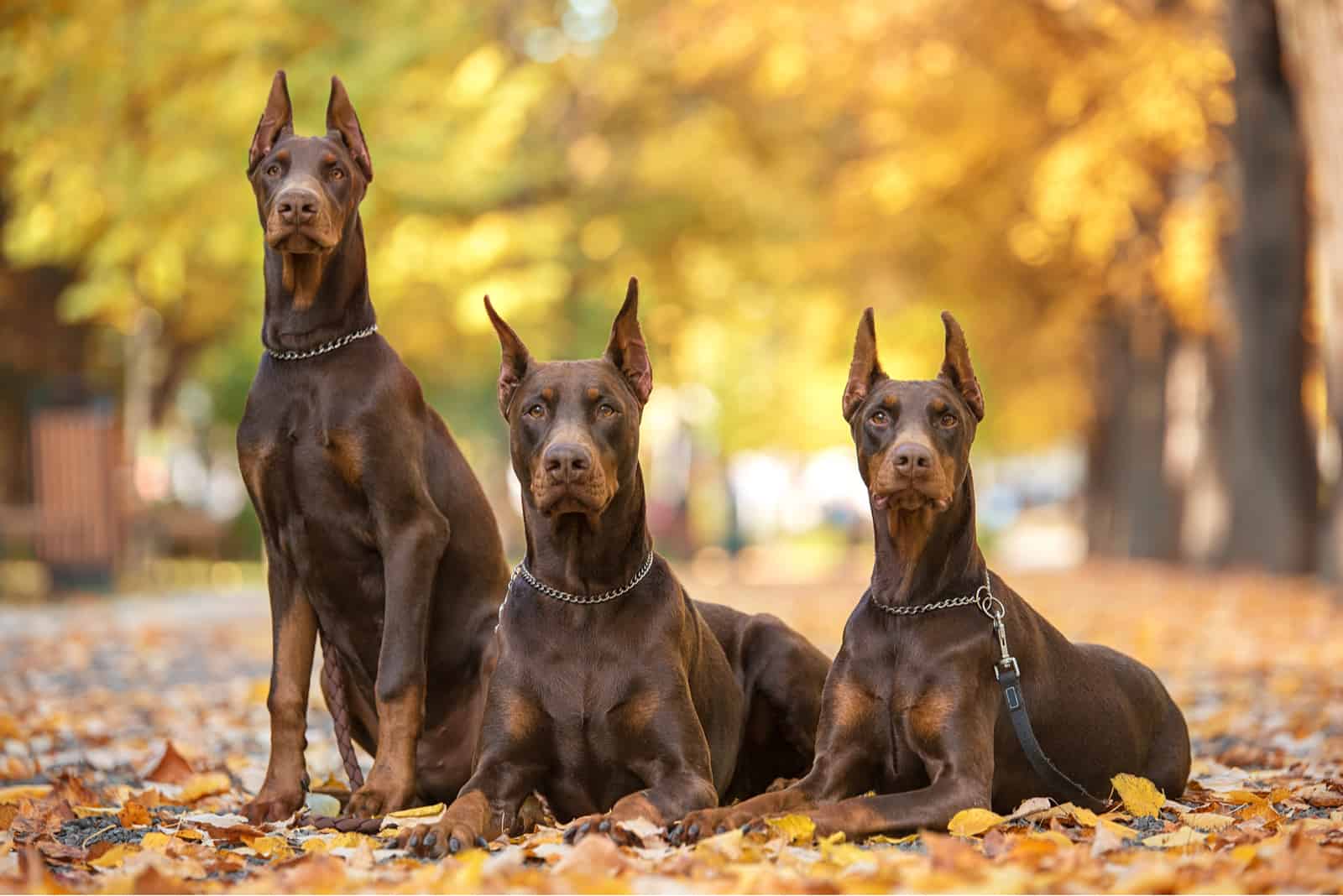
When it comes to the European vs. American Doberman, even the breeding isn’t the same!
In America, the market is much looser, and there aren’t as many strict regulations and laws.
On the other hand, in Europe, several laws define how the breeding process should look and which dogs you should and shouldn’t breed.
American Doberman Pinscher
In the US, there is no specific law surrounding Doberman breeding. Anyone can do it without rules or regulations. This makes the US a much more liberal market – which, believe it or not, has many downsides.
First off, you don’t need to pass any requirements or tests to breed a dog in the US. You may even register your puppy with the AKC without any problems.
The main requirement is for your pup to be the offspring of two AKC registered parents. If this is the case, you may even be able to complete the registration online, with nothing but a simple fee. There won’t even be any inspection of the dog!
European Doberman
Europe is a whole different story.
You’re not legally permitted to breed a Dobermann in Europe unless the dog has passed several tests, including ZTP testing.
ZTP testing consists of several standardized temperament tests designed to check out the dog’s self-assurance, nervous disposition, stability, natural drive, as well as protective instincts.
This includes the dog being placed in unfamiliar, chaotic environments and in a situation where he has to protect his owner.
If a dog fails to pass these tests, it won’t get ZTP certification. In other words, you won’t be able to breed him.
Another test that may be conducted on Dobermanns is their success in working dog events, such as IPO or Schutzhund. These events test a dog’s obedience, tracking, and protection skills.
All of this means that Dobermanns won’t likely do well in breed conformation shows, but they’ll commonly do a great job in most working dog events.
Controversy
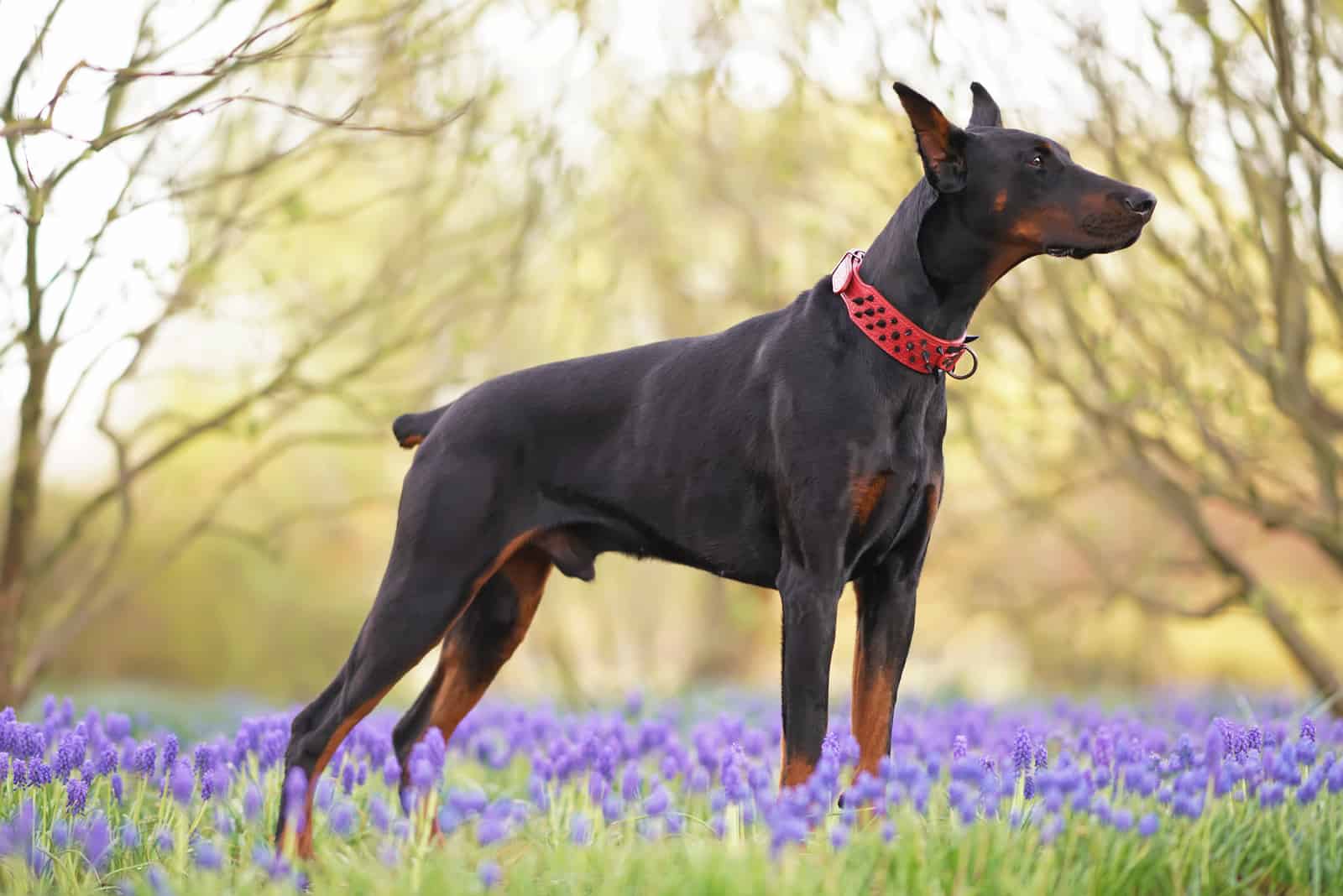
As can be concluded, the main reasoning for the differentiation of these two Doberman breeds is the different regulations in America vs. Europe.
In fact, the difference between breeding has gone on for such a long time that it has resulted in Dobermans that have a different set of features depending on the areas they are bred in. This includes not just physical characteristics but also the dog’s temperament.
Because of this, many experts believe that the American Doberman and European Doberman should be considered entirely different species.
Another issue is that there is a number of controversies regarding both of these Doberman variants. Fans of both varieties argue which one is the best.
We’ll list the arguments for both sides so that you can make a decision on your own.
American Doberman Pinscher
The AKC, which is the leading kennel club in the US, makes its list of accepted dogs primarily on looks, or rather, ‘conformation.’
In other words, dogs that have won titles at shows held by AKC have displayed exceptional physical traits, while temperamental features are ignored.
Puppies whose parents are ‘AKC Title Holders’ are desirable and sold at much higher prices.
Overall, in the US, the Doberman Pinscher is bred based mostly on looks, meaning that their disposition might not be consistent. Still, this indeed creates a dog with elegant features.
These dogs are also bred to be ‘family friendly’ and milder in temperament, so even inexperienced dog owners can deal with them.
Those opposing the American variety claim that these dogs are too timid and have lost the purpose of the ‘original’ breed. Still, one thing can’t be denied: these dogs make much more thankful pets.
European Dobermann
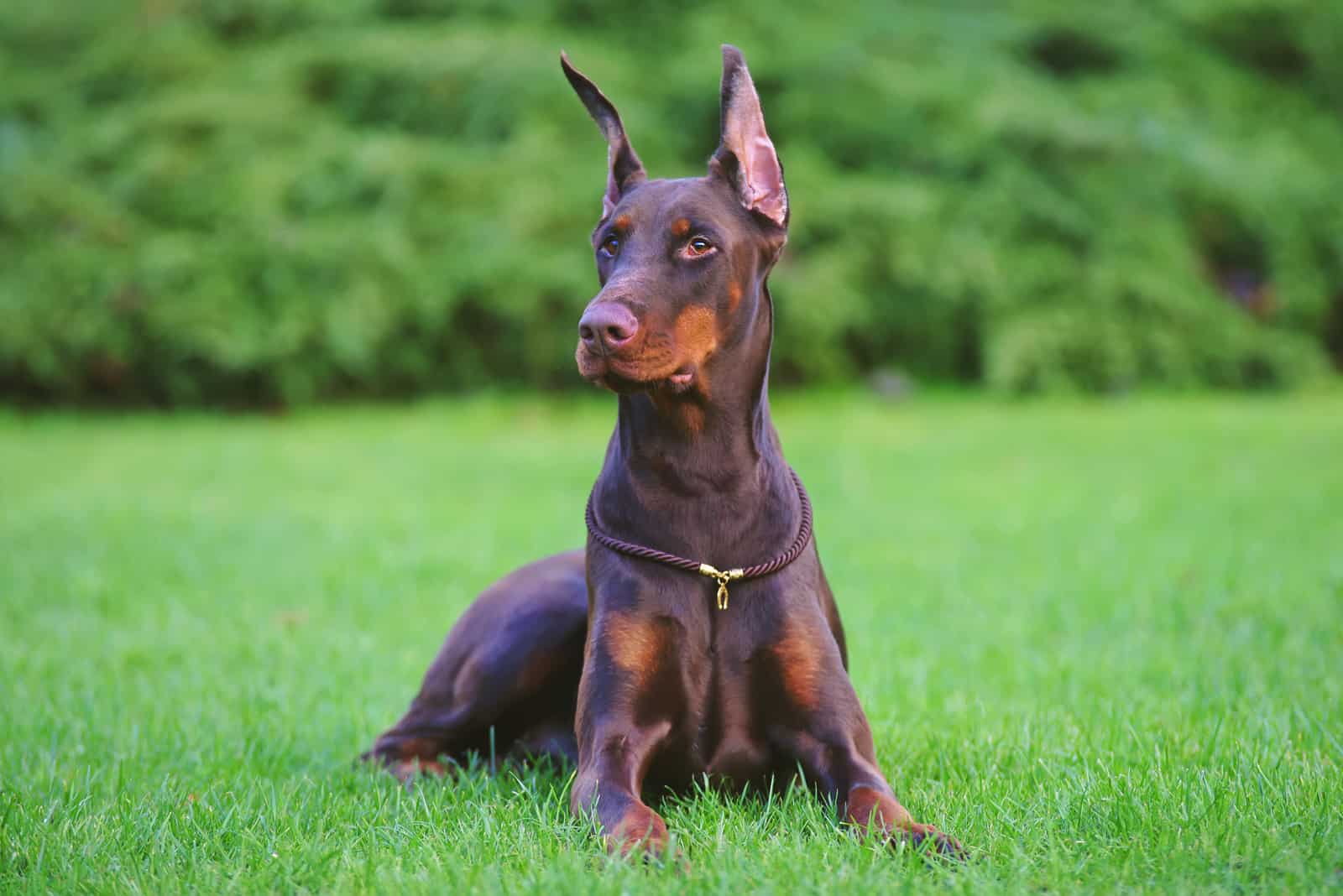
When it comes to the European Dobermann, their disposition is fairly standardized compared to their American counterparts. This is mostly because of all the tests these dogs need to pass to be bred further.
To pass all the ZTP tests, a dog needs to have a specific temperament, meaning a dog must have a high drive, be confident, and deal with stressful situations. Also, this dog needs to be protective of its owners and physically intervene when pack members need help.
Because of this, Dobermanns are strong-willed and protective dogs that will do all they can to guard your house. They will excel at law enforcement, in the military, and in similar working environments.
However, the downside of this is that Dobermanns aren’t easy to handle. On the contrary, they are not suitable for the average dog owner, and if you don’t train them well, they can wreak havoc.
Also, this dog isn’t as good-looking as its American relative while remaining emotionally distant towards its owner.
The Verdict
So, who is the winner in the European vs. American Doberman competition?
It’s hard to tell. Both varieties have certain pros and cons, and in the end, it all comes down to your own preferences.
Do you want a dog who will be a loving pet with gorgeous and elegant looks, or do you want a tough dog who will guard your home?
Keep in mind that both Doberman varieties are considered to be aggressive breeds. In fact, they have just as bad reputation as Pitbulls, Cane Corsos, or Bulldogs. Socialization is a must!
Of course, not all dogs from the same breed will have the same behavior. This depends on the individual dog.
Still, we hope these differences helped you understand this breed better.
Read Next: 13 Best Doberman Breeders In Florida
